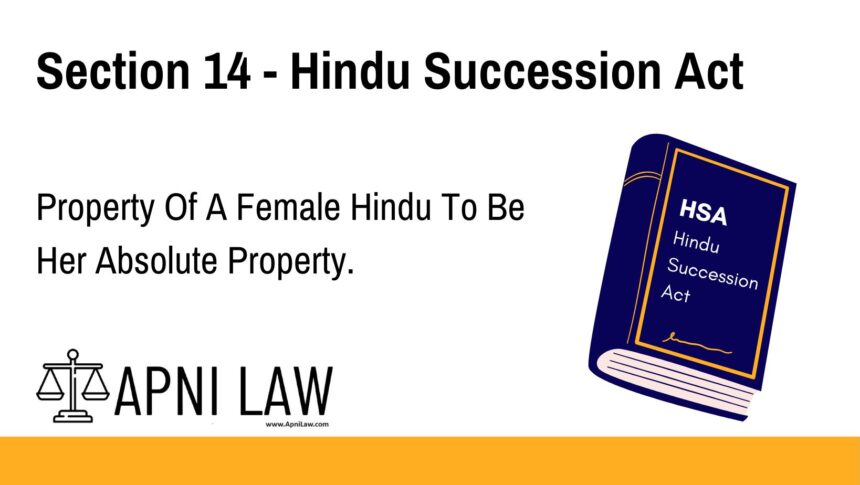Code: Section 14 Hindu Succession Act
Property of Female Hindu – Absolute Ownership
14.
(1) Any property possessed by a female Hindu, whether acquired before or after the commencement of this Act, shall be held by her as full owner thereof and not as a limited owner.
Explanation: In this sub-section, “property” includes both movable and immovable property acquired by a female Hindu by inheritance or devise, or at a partition, or in lieu of maintenance or arrears of maintenance, or by gift from any person, whether a relative or not, before, at, or after her marriage, or by her own skill or exertion, or by purchase or by prescription, or in any other manner whatsoever, and also any such property held by her as stridhana immediately before the commencement of this Act.
(2) Nothing contained in sub-section (1) shall apply to any property acquired by way of gift or under a will or any other instrument or under a decree or order of a civil court or under an award where the terms of the gift, will or other instrument or the decree, order, or award prescribe a restricted estate in such property.
Explanation of Section 14 – Hindu Succession Act
Section 14 of the Hindu Succession Act grants female Hindus absolute ownership over property they possess. This includes any property acquired both before and after the commencement of the Act. The section empowers female Hindus to hold property as full owners, meaning they are not restricted by the limited ownership rights that may have previously existed under customary law or other legal constraints.
Key Provisions:
- Absolute Ownership: Any property possessed by a female Hindu, regardless of when it was acquired, will be treated as her absolute property, including both movable and immovable assets.
- Wide Definition of Property: The term “property” includes a wide range of assets acquired by inheritance, partition, gift, or even through personal skill or exertion.
- Stridhana: Property that a female Hindu holds as stridhana (property given to her at the time of marriage or during her lifetime) immediately before the commencement of the Act also becomes her absolute property.
- Exception to Absolute Ownership: If property is acquired under specific conditions, such as through a gift, will, court order, or award that stipulates a restricted estate, those conditions will override the absolute ownership granted in sub-section (1).
Illustration
Example 1: Absolute Ownership of Property
- A female Hindu inherits property from her father. After the commencement of the Act, she holds this property as a full owner, meaning she can transfer, sell, or dispose of it without any restrictions.
Example 2: Exception to Absolute Ownership
- A female Hindu receives a gift under a will that explicitly states she holds a restricted estate in the property (i.e., she has the right to use it during her lifetime but cannot transfer ownership). In this case, the terms of the will take precedence, and she does not have absolute ownership of the property.
Common Questions and Answers on Section 14 – Hindu Succession Act
1. Does Section 14 apply to property acquired before the Act?
- Answer: Yes, Section 14 grants absolute ownership to a female Hindu for property acquired before the commencement of the Act, as well as property acquired after it.
2. What is meant by “stridhana”?
- Answer: Stridhana refers to property that is given to a female Hindu at the time of her marriage or during her lifetime. Under Section 14, any stridhana held immediately before the Act is considered her absolute property.
3. Are there exceptions to the absolute ownership rule under Section 14?
- Answer: Yes. If a female Hindu acquires property under a gift, will, court order, or award that specifically limits her ownership, then the terms of those instruments will override the general rule of absolute ownership.
Conclusion
Section 14 of the Hindu Succession Act provides female Hindus with the full ownership of any property they possess, whether acquired before or after the commencement of the Act. However, this absolute ownership is subject to any restrictions imposed by gifts, wills, court orders, or awards that specifically limit the estate.








